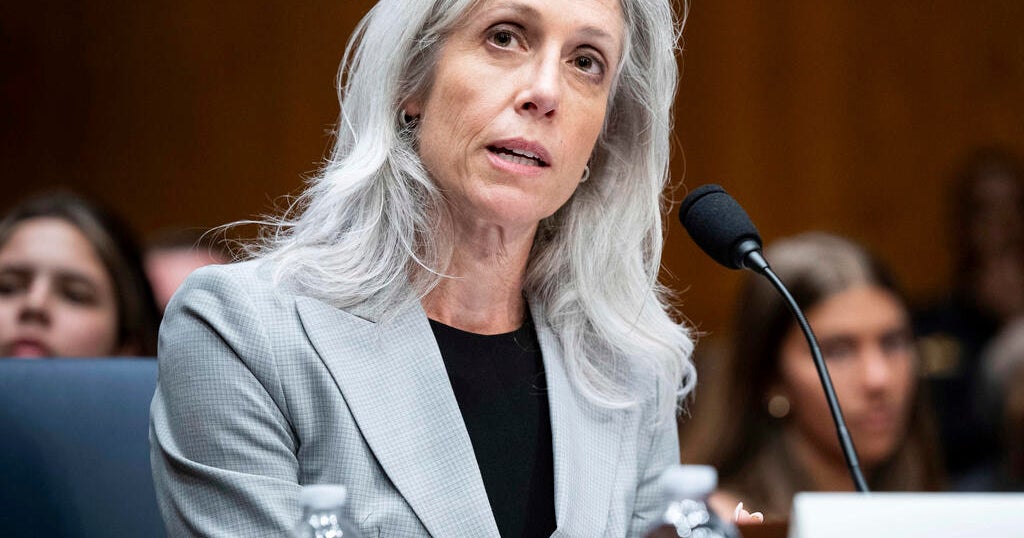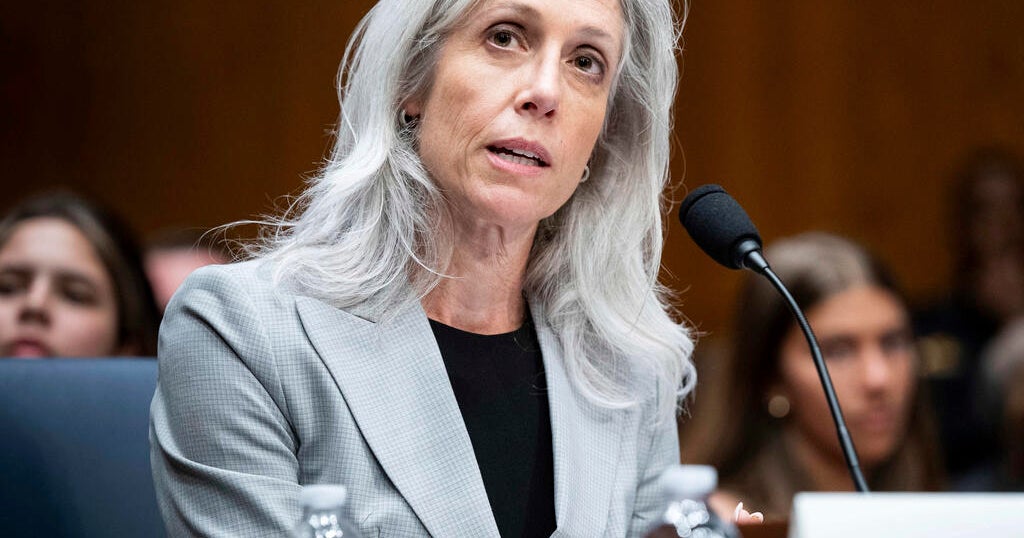

Susan Monarez, the director of the U.S. Centers for Disease Control and Prevention, is being ousted from her role less than a month after the Senate confirmed her to lead the public health agency, the White House confirmed to CBS News.
The Department of Health and Human Services announced in an X post Wednesday that Monarez no longer leads the CDC. Reports on her ouster were immediately followed by a dispute between the administration and her attorneys regarding whether she had been legally fired, with lawyers for Monarez arguing she's still in charge of the CDC and only President Trump can fire her.
It's not clear why Monarez was removed from the job — but several other top CDC officials resigned Wednesday, often citing disagreements with the Trump administration over its vaccine policy, budgets cuts to the agency, and what one described as the "weaponization of public health."
Prominent D.C.-based attorney Mark Zaid said in a statement that Monarez "has neither resigned nor received notification from the White House that she was fired." He said that he and lawyer Abbe Lowell are representing Monarez.
Zaid alleged that Monarez was "targeted" because she "refused to rubber-stamp unscientific, reckless directives and fire dedicated public health experts."
White House spokesman Kush Desai alleged in response that Monarez was terminated because she "refused to resign despite informing HHS leadership of her intent to do so."
"As her attorney's statement makes abundantly clear, Susan Monarez is not aligned with the President's agenda of Making America Healthy Again," Desai said in response to Zaid's initial statement.
Hours later, Zaid and Lowell said Monarez was told of her firing Wednesday night by a "White House staffer in the personnel office." In a statement to CBS News, they called the move "legally deficient" and argued that she remains the leader of the CDC because, as a presidential appointee, "only the president himself can fire her."
On Monday, Monarez had to cancel an agency-wide meeting because she had been summoned to Washington, D.C., according to CDC officials.
In its X post, HHS thanked Monarez "for her dedicated service for the American people," and said Secretary of Health and Human Services Robert F. Kennedy Jr. "has full confidence in his team" at the CDC.
At least three other senior CDC leaders have resigned from the agency, according to resignation emails obtained by CBS News.
Daniel Jernigan, who led the CDC's National Center for Emerging and Zoonotic Infectious Diseases, told colleagues he was leaving due to "the current context in the Department." The CDC's Chief Medical Officer Debra Houry and the head of the National Center for Immunization and Respiratory Diseases, Demetre Daskalakis, also announced their departures.
Houry's message to CDC staffers warned about the "rise of misinformation" about vaccines. She also argued planned cuts to the agency's budget will hurt the CDC.
"For the good of the nation and the world, the science at CDC should never be censored or subject to political pauses or interpretations," wrote Houry, who worked at the CDC for over a decade. "Vaccines save lives—this is an indisputable, well-established, scientific fact."
Daskalakis said in a note to CDC staff: "I am not able to serve in this role any longer because of the ongoing weaponizing of public health."
Daskalakis also posted on X a resignation letter addressed to Houry, in which he criticized recent changes to vaccine recommendations and warned of an "intentional eroding of trust in low-risk vaccines." He also said Kennedy and his staff's views "challenge my ability to continue in my current role at the agency."
"Having worked in local and national public health for years, I have never experienced such radical non-transparency, nor have I seen such unskilled manipulation of data to achieve a political end rather than the good of the American people," Daskalakis wrote.
Democratic Sen. Patty Murray of Washington, who serves on the Senate health committee, reacted to Monarez's ouster by calling for Kennedy to be fired, calling him "a dangerous man who is determined to abuse his authority to act on truly terrifying conspiracy theories and disinformation."
"If there are any adults left in the White House, it's well past time they face reality and fire RFK Jr," Murray said in a statement.
CDC departures follow months of upheaval
The sudden departures come at a tumultuous time for the public health agency. Staff are still reeling from an early August shooting outside the CDC's Atlanta headquarters by a gunman who police said was upset about COVID-19 vaccines.
Kennedy — a longtime vaccine skeptic — also fired every member of an independent CDC panel tasked with making vaccine recommendations. During Kennedy's tenure, HHS has made other moves on vaccines that have troubled public health and infectious disease experts. Kennedy halted contracts for mRNA vaccine research earlier this month, and the Food and Drug Administration on Wednesday approved updated COVID-19 vaccines for seniors and people with health conditions, but not for healthy adults and children.
Meanwhile, the CDC faced hundreds of layoffs this year.
There has been some friction between Monarez and Kennedy over COVID-19 vaccines and the CDC's vaccine advisory panel, CDC officials told CBS News. Monarez has publicly said that vaccines "save lives." The Trump administration was also unhappy with the way she had talked about the Atlanta shooting and stopped her from publishing an op-ed about the incident, the officials said.
Mr. Trump nominated Monarez to lead the CDC in late March, calling her a "dedicated public servant" who could repair what he called a loss of public confidence in the CDC "due to political bias and disastrous mismanagement." Monarez was confirmed by the Senate in a party-line vote in late July, after previously serving as the agency's acting head starting in January.
She was nominated to lead the agency after Mr. Trump pulled his initial pick for the job, former Florida Rep. Dave Weldon, a physician who was controversial in part due to his past skepticism of vaccines. In private meetings with Weldon, some Republican senators and their staffers grew concerned that he seemed unfamiliar with the CDC's operations, CBS News reported at the time.
Monarez holds a Ph.D. in microbiology and immunology, though unlike most prior CDC directors, she is not a medical doctor. She previously served as deputy director of the Advanced Research Projects Agency for Health, a federal agency that backs advanced medical research. She also worked in the Obama-era White House's science and technology office and the Department of Homeland Security during Mr. Trump's first term.
During her Senate confirmation hearing, Monarez faced a number of questions about vaccine recommendations. Kennedy has pushed a discredited theory linking routine childhood shots to autism, but during her hearing, Monarez refuted that view and said she has "not seen a causal link between vaccines and autism."
"Vaccines absolutely save lives, and if I'm confirmed as CDC director, I commit to making sure we continue to prioritize vaccine availability," Monarez told lawmakers.










-3.png)



